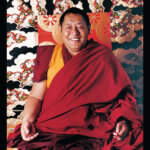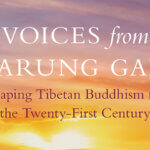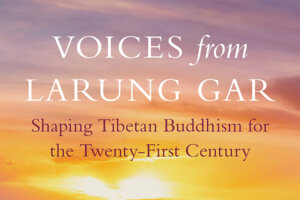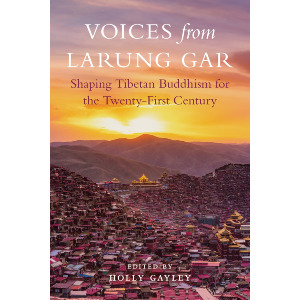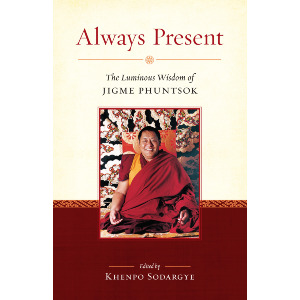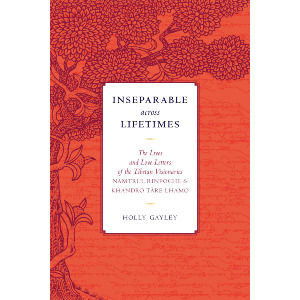An excerpt from Voices from Larung Gar.
Introduction by Holly Gayley
In his seminal work of advice, Heart Advice to Tibetans for the Twenty-First Century (composed in 1995), the renowned Khenpo Jigme Phuntsok articulates a path forward for Tibetans as a nationality. His vision of progress entails preserving Tibetan culture and its civilizational heritage while adopting new forms of knowledge and improving the standard of living for Tibetans in the arenas of economics, technology, and infrastructure. This vision of progress, which the khenpo encapsulates at one point as the “synthesis of the ancient and modern,” represents a Buddhist approach to the challenges signaled by the turn of the millennium, a key moment which for him, on the one hand, risks the decline and disappearance of Tibetan culture and, on the other hand, holds out the possibility of Tibetans making a grand contribution on the world stage. . . .
Preamble to Heart Advice to Tibetans for the Twenty-First Century
Khenpo Jigme Phuntsok (1995)
At the very pinnacle of the world, the Land of Snows was foretold by the omniscient one, our teacher the Buddha, the incomparable friend to all beings, and became the field of conversion for noble Avalokiteśvara. For many thousands of years, this place was known to history as the Buddhist kingdom of Tibet with its righteous people—brave and heroic warriors imbued with kindness, honesty, and a noble demeanor.
When Lord Atiśa, the crown ornament of all Indian paṇḍitas, arrived in Tibet, he blessed the land.
During the time of our ancestor Songtsen Gampo, many commonplace and distinctive systems of knowledge were developed. In the reign of Trisong Detsen, the empire held sway from the banks of the Ganges River in the west to the Chinese city of Chang’an (present-day Xian) in the east. There is no need to be bashful about the extent of Tibetan territory, power, and wealth.
Later, when Lord Atiśa, the crown ornament of all Indian paṇḍitas, arrived in Tibet, he blessed the land with the aspiration that Tibet remain a Buddhist kingdom in line with a prophecy made by Orgyan Padmākara, the second buddha: “When the dharma no longer flourishes in India, it will spread throughout Tibet.” That came to pass based on the kindness of Dharma kings and the efforts of the masses across the vast expanse of Tibet.
This is testimony to our history, which gives us both pride and inspiration. In this regard, it is not hyperbole for us to praise our own nationality; we should know that our people have a truly magnificent history. Then gradually, due to fluctuations over time, various periods of flourishing and decline occurred in Tibet. At present, in this new era, we can tell whether or not we are on par with the most advanced peoples. Now, there’s no time to delay! We are on the verge of the twenty-first century.
During the past century, the way people think and the way things are made have been transformed. Whatever changes have taken place, this is the nature of existence. In the midst of these changes, we Tibetan people should maintain the worthy traditions of our ancestors so that they do not vanish, including our distinctive civilization, the beneficial aspects of our values, and local customs and habits.
Tibetans should try to work together and each contribute according to his or her own capacities.
In addition, we should adopt new forms of knowledge of the modern period to the degree that they are beneficial in both the long and short term. Each and every Tibetan must think carefully about the ways to avoid falling behind the various nationalities of the world. For example, even the most humble home, like an anthill, is protected from collapse when all the members of a household are united in purpose: “If we don’t do such and such, then in the future our home will deteriorate in one or another way.”
We as a people with a magnificent history can benefit the entire world with our distinctive civilization. Otherwise, if we don’t think like this—and make do with just food and shelter—then we are more dim-witted than cattle. What a sad state of affairs!
In terms of action, above all, Tibetans should try to work together and each contribute according to his or her own capacities—virtuous and experienced elders with an orientation toward the greater good of Tibetans as a people, young intellectuals able to discern what is worthwhile in a synthesis of the ancient and modern, and lamas and tulkus who have extensive knowledge of secular and religious affairs and are able to influence others on the path to virtue. The vast majority of the population should follow their lead. With a unified approach, let us endeavor on the path forward into the future. This is very important!
Cultivate a Good Heart
For the future, in the twenty-first century, what should our approach be as Tibetans? First and foremost, everyone—young and old, male and female—should continuously cultivate a good heart. As it is said:
If your heart is good, the ground and path are also good.
If your heart is base, the ground and path are also base.
Everything depends on the purity of your intent.
So always endeavor toward a good heart.
In this regard, a good heart or intent refers to concern for other beings, including all types of people and animals down to insects. If you see any living creature suffer, you should think, “How wonderful if I could alleviate their suffering even for a moment.”
Whoever has such love and compassion, without agitation in their hearts, is always joyful.
For example, under the hot sun we hope for the slightest cool breeze, and in the cold we hope for just a bit of sunlight. Likewise, if a spark falls on our skin or a thorn pricks us, we don’t like it. If someone speaks harshly to us, we don’t want to hear it. In the same way, we should set aside wanton thoughts of harming or killing others, not only all types of people but even insects.
Further, with sensitivity, we should be pleased when the destitute find a little money, when animals are freed from slaughter, or even when someone loses something and later finds it. This is what is called love and compassion. We should regard not only our own Tibetan people but all living beings universally in this way. At the same time, we should have special affection for our own people, who share the same flesh and bone as relatives. In particular, within that, we should cherish the unique characteristics of our nationality. An attitude like this is invaluable.
Whoever has such love and compassion, without agitation in their hearts, is always joyful. Wherever they go, they bring benefit to others, experience harmony among friends, and garner praise from everyone. All their aspirations are spontaneously fulfilled. Also, in the next life, the fully matured result of love and compassion is enjoying the higher realms as a god or human. As it says in The Way of the Bodhisattva, “The result of a clear intent is abiding in Brahmā’s realm or such.” Since the result follows from the cause, for anyone who benefits others with love and compassion, this will be true not only for this life but in all subsequent lives as well.
Moreover, if all the members of a household have a good heart, then no matter how destitute, they will spend their days with a sense of well-being, since “the source of all well-being is a joyful mind.” The same is true if all the members of a community have this attitude or all the citizens of a nation. And, if everyone in the world were goodhearted then, without a doubt, peace and joy would come to the entire world.
If we look back at recent history, the damage and losses that have occurred around the world in general and within specific countries all have been the result of a detrimental mindset that wishes benefit for one’s own at the expense of others. At the beginning of this century, during World Wars I and II, there were countless causalities. When America dropped the atomic bomb on Japan, hundreds of thousands of lives were lost in a single instant. More recently in the Gulf War, terrifying modern weapons were used. How many hard-won valuables and priceless lives were lost?
If you want to lead a meaningful human life, then from now onward there is no choice but to train the mind.
Furthermore, the source of all oppression and tyranny between nations and peoples who have little regard for each other comes down to simply this: the absence of love and compassion. Specifically, if we reflect on the present course of the world, terrifying modern weapons that never existed before have been manufactured and fill the earth from top to bottom. At this juncture of time, if we sever the cord of love and compassion, all hope for human life, prosperity, and civilization on earth as a whole is lost.
If you are unable to give rise to the good intention to benefit others a hundred times, at the very least, while enjoying this human life, do not harm others. If you don’t want to suffer physically or mentally, then abandon malice that seeks to harm or kill another in order to obtain a little happiness for yourself.
Needless to say, our minds are like young stallions in need of training. A mind that is naturally oriented to benefit others from the start, without need of transformation, is rare indeed. If you want to lead a meaningful human life, then from now onward there is no choice but to train the mind. If you have good intentions, based on that alone, you will enjoy all the good things in life, both temporal and spiritual. This is vital.
Be Genuine and Honest
Second, one should be genuine and honest. Within human society, from birth until death, it’s important to be genuine at heart and honest in demeanor, whether toward individuals or other ethnicities. Make no mistake, acting in a straightforward manner without deception is a source of well-being for self and other. So, whatever you do, act without pretense or cunning, examining your motivation. For the most part, people seem to do whatever they want. But, it’s worthwhile not to do that so you won’t have anything to regret later. Otherwise, if you deceive others for your own gain, it will be difficult to sustain with no one else finding out. In the end, you don’t achieve your heart’s desire and instead encounter misfortune.
Generally speaking, Tibetans are actually quite genuine and honest. Our Tibetan brothers and sisters scattered around the world have had the opportunity to live alongside people from various places for a long time. Based on that, Tibetans are often praised for being compassionate, helpful, honest, brave, and courteous. With such an excellent legacy from our ancestors, it’s crucial not to allow our worthy traditions to decline. . . .
Share
Related Books
$24.95 - Paperback
$21.95 - Paperback
$24.95 - Paperback

